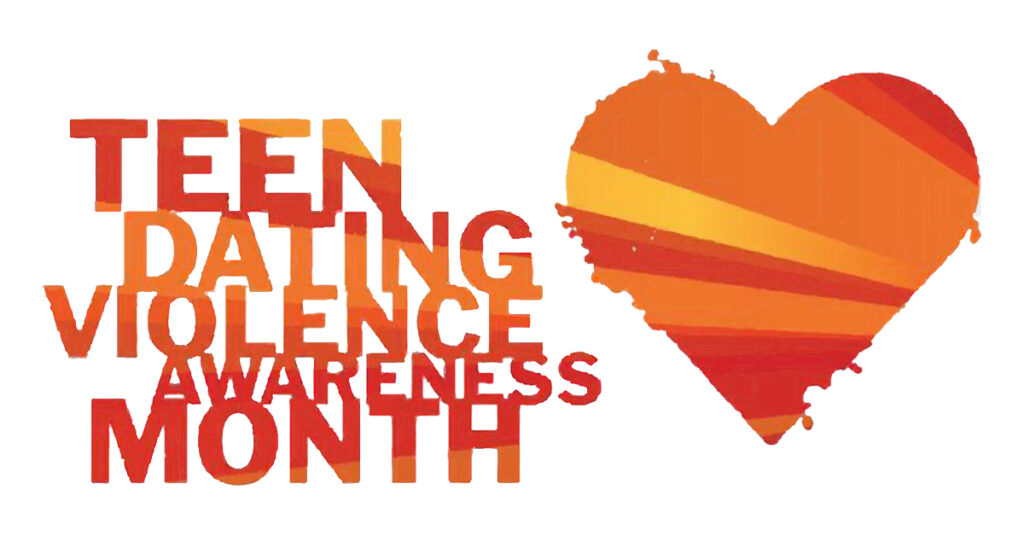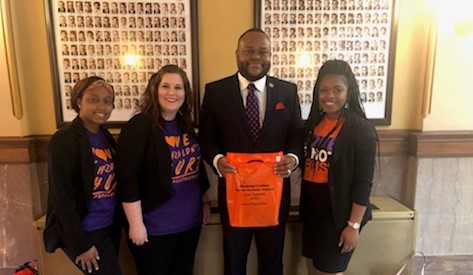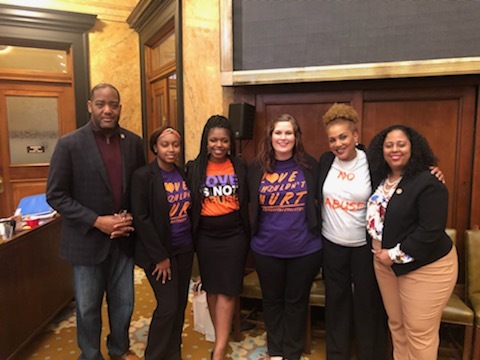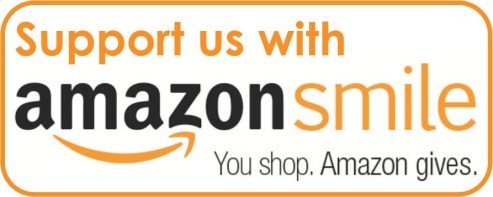
February is Teen Dating Violence Awareness Month. One in three teens in the United States has experienced some form of abuse by a dating partner, resulting in 1.5 million teens affected by dating violence annually. Dating violence is a pattern of abusive behaviors used to exert power and control over a dating partner. Vicious tactics can be different in every relationship, but usually becomes more frequent and more dangerous over time. Dating violence can include physical, verbal, emotional, or sexual abuse. It can also take place through technology, such as sending harassing messages through an app or over social media. Teen dating violence can have serious ramifications and place victims at higher risk for future harm such as depression, anxiety, eating disorders, and suicidal thoughts.
Knowing or suspecting that a teen you know is in an unhealthy relationship can be frightening and frustrating. It can be difficult deciding what steps to take or how to start a conversation. Below are a few suggestions to help your teen navigate a challenging situation.
- Listen and Give Support – Try to be supportive and non-accusatory. Ask how you can help.
- Accept What You Are Being Told – Believe them when they are brave enough to share their experience with you.
- Show Concern – Try saying, “I am concerned for your safety and I am here for you.”
- Talk About the Behavior, Not the Person – Instead of saying, “Your partner is controlling, and I don’t like them,” you can say, “I don’t like that your partner texts you to see where you are so often. How do you feel when you get those back to back messages from them?”
Join MCADV in promoting healthy relationships for teens by celebrating #Orange4Love Day on February 11th. We are asking all to wear Orange to raise awareness about teen dating abuse. Take a picture wearing Orange, post it on your social media page with the hashtag #Orange4Love, and tag @mcadvdotorg on Facebook or Instagram.
Helpful Links
MCADV is Celebrating 40 Years!

Child Custody Laws and Domestic Violence
The term “child custody” refers to the legal and hands-on relationship between a parent and his or her child. Custody includes the parent’s right to raise, care for, and make decisions regarding the child. The natural state is for the child’s biological parents to make all decisions involving the child’s residence, healthcare, education, and religious upbringing. However, when couples separate, issues often arise in situations in which unmarried individuals have children or parents who are married get divorced.
Child custody is awarded based on the best interests of the child. There are different types of custody:
(1) Physical and legal custody to both parents jointly;
(2) Physical custody to both parents jointly and legal custody to either parent;
(3) Legal custody to both parents jointly and physical custody to either parent;
(4) Physical and legal custody to either parent; or
(5) Physical and legal custody to a 3rd party based on a finding by the court that the parents either abandoned/deserted the child or both parents are mentally, morally, or otherwise unfit to rear the child.
When custody of a child is in dispute, there is a presumption that it is detrimental and not in the best interest of the child to be placed in any type of custody with a parent that has a history of perpetrating family violence. This is determined by the court findings of evidence that an incident of family violence has resulted in serious bodily injury to or a pattern of family violence against the party making the allegation. Custody is awarded to a 3rd party only after the natural grandparents have been excluded. Such person shall not allow access to a violent parent except as ordered by the court.
If both parties have a history of perpetrating family violence, but the court finds that parental custody is in the best interest of the child, custody will be awarded to the parent that is less likely to continue to perpetrate family violence. If allegations of domestic violence are unfounded, the chancery court will order the alleging party to pay all court costs and reasonable attorney’s fees incurred by the defending party.
If you or someone you know have questions about child custody laws in regards to domestic violence, you can contact our Legal Services Coordinator, Kalleigh McCoy by calling 601-882-5550 or emailing legalservices@mcadv.org.
Advocacy Thursdays at the Capitol
In observation of Teen Dating Violence Awareness Month ( February) members of the MCADV team educated legislators in the halls of the Capitol about the importance of school based curricula that help students understand and learn about Teen Dating Violence. With the help of Representative John Hines, team members were able to spread awareness by providing resource cards to legislators. Each resource card outlined statistics and hotline information for those that may be in need.

Pictured left to right: Kierra Kendrick, Kalleigh McCoy, House Representative Otis Anthony (District 31), Robin Jackson

Pictured left to right: House Representative Orlando Paden (District 26) Kierra Kendrick, Robin Jackson, Kalleigh McCoy, Paula Granger, House Representative Zakiya Summers (District 68)
For more information about Advocacy Thursdays, contact Policy and Systems Advocacy Coordinator Robin Jackson by calling 601-981-9196 or sending an email to robin.jackson@mcadv.org. Click here to view the 2020 Legislative Advocacy Calendar.
Shelter Spotlight

“We’re taking services and awareness to where the people are.” Care Lodge has provided support and education for the community for 39 years. As the needs throughout the community continue to change, this agency does all it can to move in directions that best address those needs. Whether meeting a victim in a hospital room or a parent at a local school office, Care Lodge continues to share a message of hope for all. Men, women, and children from a myriad of backgrounds have been served through shelter and non-shelter services. Agency staff has presented awareness on interpersonal violence and safety planning for church congregations, college students, and youth-based organizations throughout east central Mississippi.
Recently, advocates presented information during briefing meetings with law enforcement on shelter entry procedures while encouraging the work officers do to provide safety for victims and promote offender accountability. Additionally, the agency has provided vital information to residents within Housing Authority subdivisions to inform them of Victim Rights, supportive services, and safety planning for the welfare of their family or neighbors who may be at risk for abuse.
The digital audience is another community this agency is working hard to impact in a deeper way. Care Lodge posts content through links to articles, community partners, and inspirational quotes to platforms such as Facebook, Instagram, Twitter, and CareLodge.com. The digital world is easier for some to access for help. Often, it offers a sense of belonging to a community that understands what survivors are experiencing on a more personal level.Visit Care Lodge’s website and social media by clicking the links below.
Amazon Smile
AmazonSmile is a great way to support MCADV anytime you shop, at no cost to you. When shopping at smile.amazon.com, you’ll find the exact same low prices, vast selection and convenient shopping experience as Amazon.com, with the added bonus that Amazon donates 0.5% of the price of your eligible AmazonSmile purchases to your charitable organization.
MCADV invites you to shop AmazonSmile by clicking the button below. Proceeds from shopping through the link will go towards continued efforts to combat domestic violence.Click below to shop AmazonSmile.

